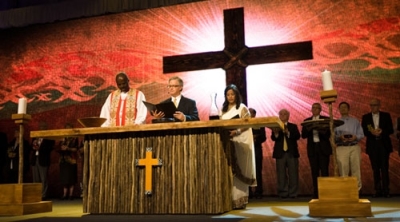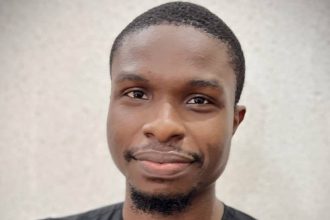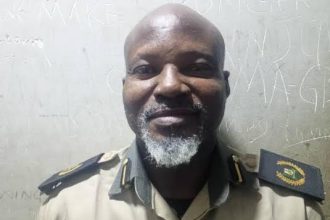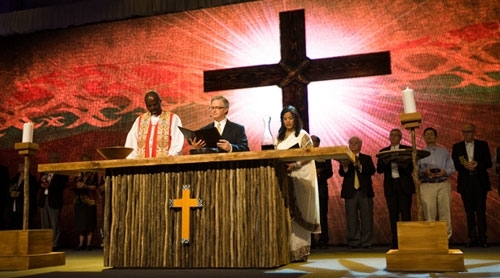
In Colossians 3:10-11 (NLT) the apostle Paul encourages believers to, “Put on your new nature, and be renewed as you learn to know your Creator and become like him. In this new life, it doesn’t matter if you are a Jew or a Gentile, circumcised or uncircumcised, barbaric, uncivilized, slave, or free. Christ is all that matters, and he lives in all of us.”
Our new nature … a new life … Christ is all that matters.
This opinion piece is born out of a tumult of conversation already emerging in anticipation of the fourth Lausanne Congress on World Evangelization being held in Incheon, South Korea, popularly known as Lausanne 4 (L4). For the uninitiated, the name of the congress was fixed when the first congress was held in Lausanne Switzerland.
The first gathering was convened by Billy Graham but with other Evangelical Protestant luminaries such as John Stott (Langham), and Clyde Taylor and Waldron Scott (World Evangelical Alliance) involved. Many other leaders participated, both Western and non-Western.
While numerous conversation spaces exist in the Protestant world, those convened by the Lausanne movement have arguably been the most influential for grass-roots Evangelical Christians throughout the world.
Evangelical essentials
Among the values I appreciate about world Evangelicalism is that it embraces a great deal of diversity yet holds to a small set of non-negotiables. We can argue about what is actually non-negotiable, but we agree that the most important are: Father, Son and Spirit, the whole Bible, the whole Gospel, and activity by the whole Church that blesses the whole world.
When Evangelicals of different kinds come together, however, it is what our British friends would call “a bun fight”. Strong voices can vie for their perspective to be accepted as a universally orthodox Evangelical position.
Out of these intersecting tensions of difference emerged some quite spectacular position statements: the Lausanne Covenant (L1, 1974), the Manila Manifesto (L2, 1989), and the Cape Town Commitment (L3, 2010). Fifty years after the first congress, the Seoul Statement (L4, 2024) will emerge, currently drafted but not yet debated.
Creative tensions
It would be rare to find a participant of previous Lausanne events fully satisfied with the official outcome. Some participants may have been more influential than others, but ultimately what emerged as the historic record was something of a tempered compromise.
The written artifacts became reference tools to guide future generations of Evangelical students. The Covenant and the Manifesto were central to my undergraduate missionary training. I was not present for the conversation in Cape Town, but the writing of the Commitment was guided by my friend Christopher J H Wright (of Langham at the time), one of my MA in missions professors. L4 will be the first opportunity for me to actively participate in some small way in what will emerge as the Seoul Statement. As the convenors have stated, it is “a once in a generation event.”
The opportunity excites me. Not because of the huge amount of content that the Lausanne Movement has already produced to prime us for the conversation, potentially constraining what can be discussed, but because of the many conversations that will emerge during and around the program — which, for the first time, will be both in-person and online.
When World Christianity of the Evangelical kind gathers there needs to be room for robust debate on issues of contemporary importance, whether or not they happen to be on the official agenda. What cannot happen is the imposition or dominance of one cultural perspective over another.
While the subject matter discussed will be more conceptual than contextual, it is an opportunity for a unique co-creation to emerge from a meeting of hearts and minds from different parts of the world toward healthier global Evangelical unity. After all, the principles found in the three previous declarations did just that.
In the essentials, unity
There will always be non-negotiables for some that are not accepted by others. In missions circles we call these doctrinal preferences “secondary issues,” taking care to not let our different convictions spoil the unity of the whole. As champion of the Moravian movement, Count Nikolaus Ludwig von Zinzendorf, is quoted as saying, “In essentials, unity; in non-essentials, liberty; in all things, charity” (likely quoting Rupertus Meldenius).
While we all hold to a central commitment to the resurrected Lord Jesus, Protestantism has fragmented World Christianity according to cultural convictions that, while biblically defensible, are largely interpretations of scripture from within particular contexts. The conclusions may be fine for their context, or for the context in which they were first developed, but not necessarily applicable to another where the same texts are seen from a different vantage point. And we need to remain committed to extending liberty on these secondary issues.
A Māori example
The fractured lenses of our culturally-informed Christianities were no more evident to me than in some queries I received in response to the widely televised farewell to our Māori king and the coronation of his daughter, a young new Māori queen (27 years old). A Christian presence was publicly visible. Most expressions of faith in Jesus were represented during the week-long tangihanga (funeral). Some Evangelical friends wanted to know which denomination the Māori royal line belonged to. My answer, “all of them,” did not compute. For most Māori followers of Jesus such a question is irrelevant.
The role of the royal family is to hold and promote “kotahitanga” (unity) among the confederation of Māori tribes. Their faith in Jesus makes room for all expressions of faith as they guard and promote the well-being of our people in all of our diversity. I am not advocating for a kind of universalism here, this unity is more sociological than theological — an expression of full religious freedom.
When the Gospel first came to our lands in the early-mid 19th century, Protestant denominationalism among the first missionaries was very perplexing to Māori. On the one hand they were told of Jesus, the great equalizer and peacemaker for all peoples, yet at the same time Jesus’ followers among the British and Europeans were separated into quite distinct faith traditions. Which of them was the true faith? Māori followers of Jesus (by a recent accounting 90% of the population by the 1850s) tended to align with the denomination of whichever missionary worked among them, but such commitments were always secondary to inter-tribal relationships as Māori followers of Jesus. Where there was once brutal tribal warfare, in Christ it abruptly ceased. Denominationalism was not going to create it again.
Present your offering to God
When Māori gather, the Gospel can be freely shared, but as an offering, alongside other faiths present, narratives of the old gods, and stories of the accomplishments of famous ancestors — all accepted as non-fiction, with all participants learning in some way from one another’s convictions. This is what religious freedom looks like in a religiously pluralistic context. The very large turning to Christ by Māori was in no small way due to the fact that the biblical narrative of Jesus was tested and proved more powerful than the other stories. When it comes to power encounters, the debate ends. Our God reigns, Jesus reigns.
A Māori paradigm would assume that whether as a family (local church or ministry), clan (regional organization), or tribe (national or global organization), groups are free to love and serve the Lord in ways most meaningful for their contexts. When different tribes gather together, as they did to farewell the king and welcome the queen, or as 10,000 or so of us will do for Lausanne 4, it is respectful to hold our distinct convictions lightly in favor of wider common commitments. We can offer our convictions into the mix, but the co-created outcome should represent a wide agreement on a matter — the leading of the Holy Spirit in the unity of the Son for the glory of the Father.
Co-creating new creation
At L4 some prior agreement on our communal Evangelical consensus may be open for adjustment to match the knowledge we have now and the times we live in, but the focus should never drift too far from our common unity. Whereas common interests for Māori are typically genealogical heritage and issues of self-determination, our well-being as a colonized people, for Evangelical Christians it is our love for Jesus, our oneness in Christ, and our desire for the whole world to have an opportunity to enjoy the blessings of reconciliation with God and one another through Christ — a mutual flourishing.
In my opinion, our commitment should be focused on how we can co-create new creation in any given context — the tangible transforming evidence of Jesus’ reign, God’s Kingdom in the world. This is something we can only hope to do in part on this side of eternity, but we do it with the assurance of fullness to come with Christ’s return. Our efforts to this end are our witness to the world as Jesus’ family. By demonstration and proclamation, we aim for a propagation of the Gospel that transforms our broken worlds with the love of Christ — more often than not, requiring power encounters.
Transformed in loving diversity
Regardless of who we are, or what we think we should do, it is only Christ that matters. His life lived out in and through us makes all the difference as we meaningfully influence our contexts for God’s glory. Our new life in him transforms, elevates, enhances, our uniqueness as “a Jew or a Gentile, circumcised or uncircumcised, barbaric, uncivilized, slave, or free”, British or Māori, Chinese or American, Palestinian or Israeli, Zulu or Afrikaner, Rohingya or Burmese, North or South Korean. Through the cross, Jesus has broken down all walls of hostility created by laws that separate, whether Mosaic or from other backgrounds. In Jesus we mature in such a way that hostilities cease. Instead, we bring the best of who we are to positively influence one another toward the full stature of Christ.
As 5,000 Evangelical leaders gather in Incheon, and potentially the same number again online, it will benefit us to keep our eyes on Jesus, the author and completer of our faith, even as we wrestle with problems that beset our worlds and hinder the demonstrative spread of the Gospel. Through all the robust debate, may we aspire to love one another and treat each other with the upmost respect. God be gracious to us all.
Originally published at Christian Daily.
Dr Jay Matenga is a contexual theologian of Maori heritage. He serves as the Executive Director of the World Evangelical Alliance’s Mission Commission and Opinion Editor for Christian Daily International. Jay has served cross-cultural missions for over 30 years, with missionary deploying agencies and missions alliances. Jay’s passion is to strengthen participation by the people of God in the purposes of God towards co-creating new creation for the glory of God. Jay keeps a monthly blog and other contributions archived at https://jaymatenga.com.







